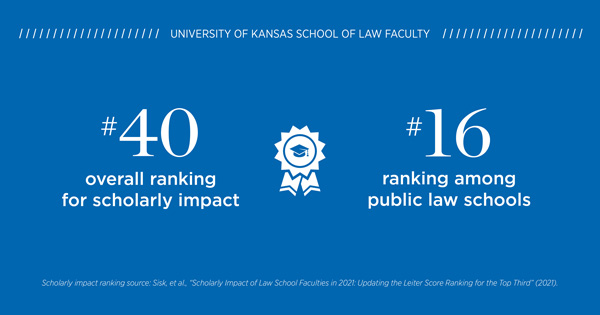KU Law ranks 16th for faculty scholarly impact among public law schools

LAWRENCE – The University of Kansas School of Law ranks 16th in the nation among public law schools and 40th overall for scholarly impact, according to a new study.
The study measures scholarly impact based on law journal citations to the work of tenured faculty members over the past five years. Only law schools placing in the top third for scholarly impact are included in the published rankings. The rankings are widely considered to be a leading measure of faculty productivity within legal academia.
KU Law climbed eight spots in the 2021 rankings, tying for 40th overall. The study, conducted by a team of academics, is updated every three years. This is the third consecutive report where KU Law has moved up, ranking 48th in 2018 and 64th in 2015.
In hitting this mark, KU Law beat out several peer law schools, including Iowa, Indiana-Bloomington, Wisconsin, Florida, Brigham Young, Missouri and Georgia. KU’s scholarly impact ranking exceeded the ranking of several law schools affiliated with fellow members of the Association of American Universities (AAU).
“As a unit within an AAU institution, scholarship is an expected and valued component of a faculty member’s responsibility,” said Stephen Mazza, dean and professor of law. “Active scholars also bring national attention to the institution and enrich the classroom experience for students by incorporating cutting-edge issues into class discussion.”
The study reports mean and median citation scores for 70 ranked law schools. The two reported scores for KU Law were close, indicating citations were spread out among tenured faculty.
“KU Law’s success in this ranking is not driven by one or two faculty – it is truly a team effort,” Mazza said. “While law journal citations to tenured faculty work are one way to show faculty impact, we are proud of the leadership and service our tenured, tenure-track and clinical faculty provide in their areas of expertise.”
KU Law faculty are routinely called upon to provide expertise and context to Kansas legislators considering law and policy changes. They serve on boards, committees, councils and other bodies that provide direct benefit to residents across the state of Kansas. They also teach continuing legal education programs throughout the state, ensuring practicing attorneys are equipped with the most up-to-date knowledge as they serve their clients.
Infographic: Scholarly impact ranking source: Sisk, et al., “Scholarly Impact of Law School Faculties in 2021: Updating the Leiter Score Ranking for the Top Third” (2021).